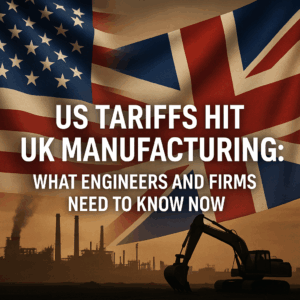Introduction
In a sudden and sweeping move, the U.S. government has expanded tariffs of up to 25% on over 400 British-made products containing steel or aluminum. The new measures have blindsided UK manufacturers, sending shockwaves across sectors such as automotive, heavy machinery, and consumer goods.

1. What’s Happening & Why It Matters
The tariffs came into effect immediately, leaving goods already en route to the U.S. subject to unexpected charges and port backlogs.
Scope & Surprise: Products hit include washing machines, motorcycles, furniture, fire extinguishers, and children’s items.
Policy Drivers: The move is linked to renewed U.S. protectionism, with domestic steel and aluminum lobbies pushing for stronger trade barriers.
Industry Impact: Manufacturers now face steep compliance challenges, additional costs, and uncertainty about export viability.
2. Sector Spotlight: Automotive & Heavy Machinery
JCB warned that the tariffs will cost the company hundreds of millions of pounds, impacting exports of diggers and heavy machinery, including military contracts in the U.S.
Triumph Motorcycles was caught off guard, facing sudden cost hikes despite strong sales performance in the U.S. market.
Premium carmakers such as Aston Martin and Jaguar Land Rover are also exposed, with some companies halting U.S. shipments and warning of reduced profits.
These sectors are particularly vulnerable because a significant portion of their global sales depends on the American market.
3. Broader UK Manufacturing Climate
The wider UK manufacturing landscape is also suffering:
The CBI reported that Britain’s manufacturing order books dropped to their weakest level since early 2025.
Export demand has slumped, with the U.S. no longer ranking among the top growth markets for UK producers.
Confidence across factories has been hit, with firms citing tariffs, inflation, and global uncertainty as contributing factors.

4. What’s Next: Trade Talks and Possible Relief
Economic Prosperity Deal (EPD): Earlier this year, the UK and U.S. announced trade progress aimed at reducing tariffs on cars, aerospace components, and metals. However, these agreements remain non-binding and have not yet been implemented.
Implementation Delays: The U.S. continues to scrutinize the origin of UK exports, holding back on exemptions until supply chain checks are satisfied.
Outlook: Further tariff reviews are expected in the coming months, raising the possibility of even more products being targeted.
5. Recommendations for UK Engineers & Firms
Audit Product Materials: Review supply chains and document steel/aluminum content to prepare for compliance.
Collaborate With Buyers: Work closely with U.S. partners to streamline customs clearance.
Diversify Markets: Explore opportunities in Europe and Asia to offset U.S. demand losses.
Stay Proactive: Monitor trade updates and be ready to respond quickly if tariff exemptions or relief measures are introduced.

Conclusion
The August 2025 tariff expansion marks one of the most significant disruptions to UK–U.S. trade in decades. For engineers, plant managers, and exporters, the challenge is twofold: absorbing immediate financial shocks while preparing long-term strategies for resilience.
Adaptation through compliance, diversification, and strategic advocacy will be essential for survival, and growth, in this new trade reality.
Sources
The Times – Trump shocks UK business with stealth tariffs on 400 products
The Times – JCB warns US tariffs will cost “hundreds of millions”
Reuters – UK factories report new downturn and weak outlook, CBI says
Financial Times – US tariffs threaten lay-offs at UK luxury car plants
The Guardian – UK factories suffer fastest export slump in five years
#USTariffs #UKManufacturing #EngineeringUK #TradeImpact #SupplyChain #AutomotiveIndustry #ExportChallenges #ManufacturingResilience #EngineeringInnovation #GlobalTrade



